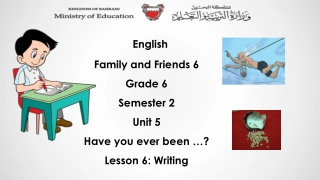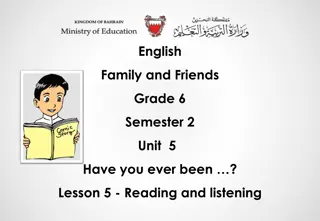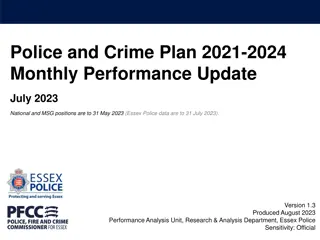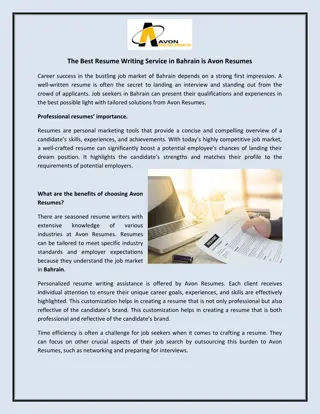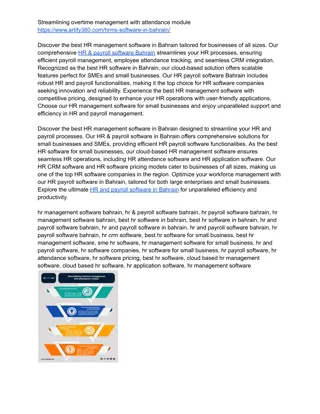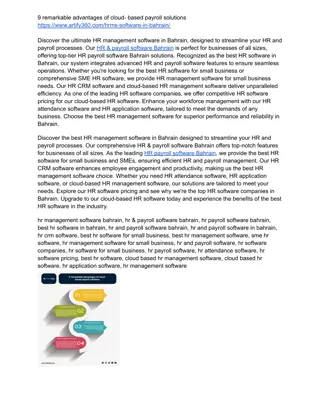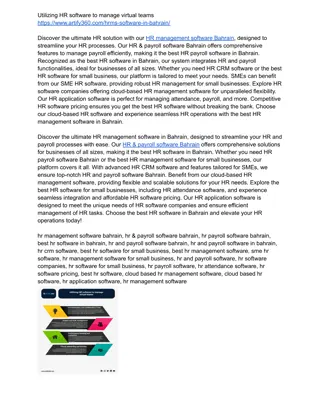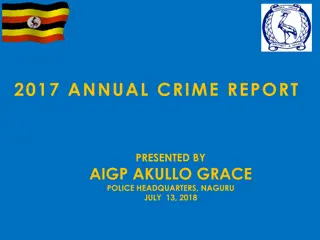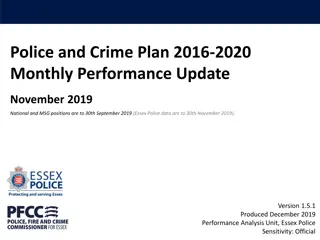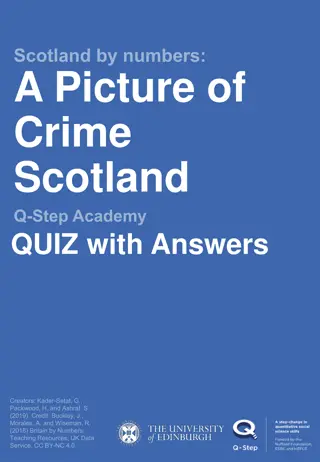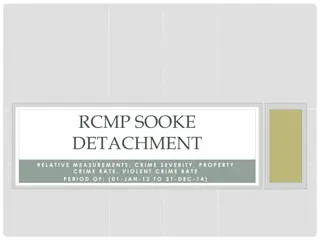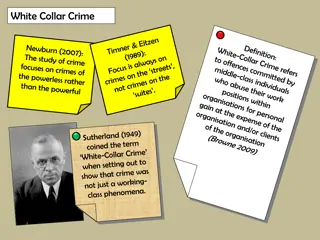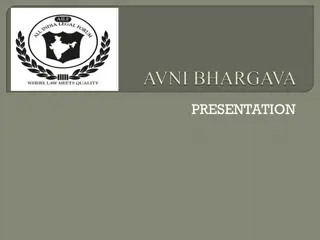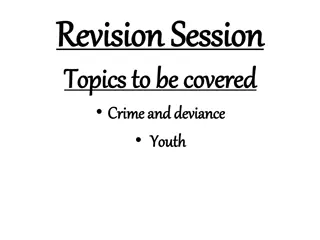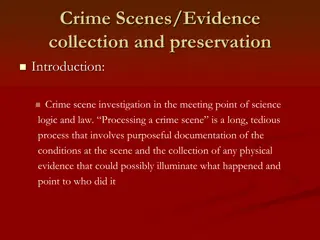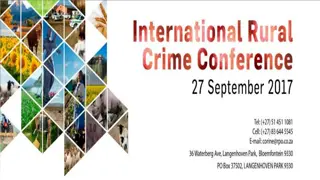Understanding Crime: Analyzing Bahrain's Safety and Causes
Explore the safety and security status of Bahrain based on indicators like organized crime and police reliability. Learn how science contributes to crime-solving. Delve into the causes of crime in different parts of the world through academic studies and social factors.
Download Presentation

Please find below an Image/Link to download the presentation.
The content on the website is provided AS IS for your information and personal use only. It may not be sold, licensed, or shared on other websites without obtaining consent from the author. Download presentation by click this link. If you encounter any issues during the download, it is possible that the publisher has removed the file from their server.
E N D
Presentation Transcript
Secondary Education Grade 10 English 102 New Language Leader Unit 7.1 CRIME LAB Eng. 102 Unit 7 / Lesson 1 CRIME LAB Ministry of Education Second Semester 2020 / 2021
Eng. 102 Unit 7 / Lesson 1 CRIME LAB OBJECTIVES By the end of the lesson, students will have: found out how science is used to understand and solve crime. read for gist and specific information worked out the meaning of verbs from context. studied the use of should, must and have to in affirmative, negative and question forms. Practiced must and have to in controlled and free practice. Eng. 102 Unit 7 / Lesson 1 CRIME LAB Ministry of Education Second Semester 2020 / 2021
Eng. 102 Unit 7 / Lesson 1 CRIME LAB How safe is Bahrain? How safe is Bahrain? In its Global Competitiveness Report 2019, the World Economic Forum (WEF) published the following data about security in Bahrain. Based on the indicators below, how safe do you think Bahrain is? Do you think crime is a big issue in Bahrain? Indicator Rank (out of 141 countries) Security 4 Organized Crime 3 Reliability of Police Services 5 Eng. 102 Unit 7 / Lesson 1 CRIME LAB Ministry of Education Second Semester 2020 / 2021
How safe is Bahrain? How safe is Bahrain? SUGGESTED ANSWERS In its Global Competitiveness Report 2019, the World Economic Forum (WEF) published the following data about security in Bahrain. Based on the indicators below, how safe do you think Bahrain is? Do you think crime is a big issue in Bahrain? Indicator Rank (out of 141 countries) Security 4 Organized Crime 3 Reliability of Police Services 5 1- Bahrain is one of the most secure countries in the world. It is ranked 4th out of 141 countries. 2- Organized Crime is very limited in Bahrain. Bahrain is among the three best countries in this regard. 3- Police services in Bahrain are extremely reliable. At the world level, they are among the most trustworthy. Eng. 102 Unit 7 / Lesson 1 CRIME LAB Ministry of Education Second Semester 2020 / 2021
What causes crime? What causes crime? In some parts of the world, crime rates are still high. Can you think about the factors or causes which lead to such a rise? Causes Read the text in the following slide and try to complete the diagram on the right with precise answers. Eng. 102 Unit 7 / Lesson 1 CRIME LAB Ministry of Education Second Semester 2020 / 2021
What causes crime? What causes crime? The past few weeks have seen the publication of three heavyweight academic studies on the causes of crime and social breakdown in Britain. The findings have been met with very different receptions. The first research study, Crime and Unemployment Despite Denials, suggested that the rise in crime over the past 20 years is very closely connected with the upsurge in mass unemployment. The work of David Dickinson, an economist writing for the Labour Institute for Public Policy Research, examined long-term trends in great detail and, among many other things, demonstrated the simple fact that most criminals are unemployed. The second study, Imprisoned Fathers and their Children: A Reflection on Two Decades of Research, by Gwyneth Boswell of the University of East Anglia, reported on the backgrounds of children who commit crimes. Again the picture was grim. After looking at 250 juveniles in prison or in care for the most serious crimes, Dr. Boswell found out that 40 per cent had been beaten and bullied before they turned to crime. The third study was the Massive Psychosocial Disorders in Young People published by Sir Michael Rutter of the Institute of Psychiatry at London University and Professor David Smith of Edinburgh University. Their findings were radically different. Forget about poverty and bullying, they seemed to say, the real causes of crimes, as forms of social and psychological disorders, were the decline in morals and upsurge in personal freedom and selfishness in the last few decades. It should come as no surprise that, of the three studies, it was the Rutter-Smith report that received all the attention from the British media. It was the one that challenged an idea that seems both natural and sensible to most of us: that need causes crime as well as greed. When people find that they are unable to afford necessities, or luxuries, they are more likely to be tempted to steal. Against this background, the evidence collected by Rutter- Smith clearly suggests that a country's morals determine whether it is a happy and safe place to live or not. Eng. 102 Unit 7 / Lesson 1 CRIME LAB Ministry of Education Second Semester 2020 / 2021
What causes crime? What causes crime? SUGGESTED ANSWERS In some parts of the world, crime rates are Unemployment somehow high. Can you think about the upsurge in personal freedom and selfishness factors or causes which lead to such a rise? Violence against children Causes Read the text in the following slide and try decline in morals to complete the diagram on the right with bullying precise answers. Eng. 102 Unit 7 / Lesson 1 CRIME LAB Ministry of Education Second Semester 2020 / 2021
What causes crime? What causes crime? Read the text again and complete the following table with precise information. Research Study Title of Research Study Name of Researcher(s) Institution Research Study 1 Research Study 2 Research Study 3 Eng. 102 Unit 7 / Lesson 1 CRIME LAB Ministry of Education Second Semester 2020 / 2021
What causes crime? What causes crime? The past few weeks have seen the publication of three heavyweight academic studies on the causes of crime and social breakdown in Britain. The findings have been met with very different receptions. The first research study, Crime and Unemployment Despite Denials, suggested that the rise in crime over the past 20 years is very closely connected with the upsurge in mass unemployment. The work of David Dickinson, an economist writing for the Labour Institute for Public Policy Research, examined long-term trends in great detail and, among many other things, demonstrated the simple fact that most criminals are unemployed. The second study, Imprisoned Fathers and their Children: A Reflection on Two Decades of Research, by Gwyneth Boswell of the University of East Anglia, reported on the backgrounds of children who commit crimes. Again the picture was grim. After looking at 250 juveniles in prison or in care for the most serious crimes, Dr. Boswell found out that 40 per cent had been beaten and bullied before they turned to crime. The third study was the Massive Psychosocial Disorders in Young People published by Sir Michael Rutter of the Institute of Psychiatry at London University and Professor David Smith of Edinburgh University. Their findings were radically different. Forget about poverty and bullying, they seemed to say, the real causes of crimes, as forms of social and psychological disorders, were the decline in morals and upsurge in personal freedom and selfishness in the last few decades. It should come as no surprise that, of the three studies, it was the Rutter-Smith report that received all the attention from the British media. It was the one that challenged an idea that seems both natural and sensible to most of us: that need causes crime as well as greed. When people find that they are unable to afford necessities, or luxuries, they are more likely to be tempted to steal. Against this background, the evidence collected by Rutter- Smith clearly suggests that a country's morals determine whether it is a happy and safe place to live or not. Eng. 102 Unit 7 / Lesson 1 CRIME LAB Ministry of Education Second Semester 2020 / 2021
What causes crime? What causes crime? SUGGESTED ANSWERS Read the text again and complete the following table with precise information. Research Study Title of Research Study Name of Researcher(s) Institution Research Study 1 Crime and Unemployment Despite Tory Denials Labour Institute for Public Policy Research David Dickinson Imprisoned Fathers and their Children: A Reflection on Two Decades of Research Research Study 2 Gwyneth Boswell University of East Anglia - Institute of Psychiatry at London University - Edinburgh University Massive Psychosocial - Sir Michael Rutter Research Study 3 Disorders in Young People - Professor David Smith Eng. 102 Unit 7 / Lesson 1 CRIME LAB Ministry of Education Second Semester 2020 / 2021
What causes crime? What causes crime? Focus on the last paragraph in the text and try to answer the following two questions. 1- In which research study was the British media interested the most? -------------------------------------------------------------------------------------------------------------------------------------------------------- 2- What is special about this research study? -------------------------------------------------------------------------------------------------------------------------------------------------------- 3- Find words which mean the same as the given definitions below. Choose from the highlighted words in the text. Definitions Words from the Text to show or make something clear . worrying . failure to work or function correctly . a sudden and usually large increase in something . results . important or serious . when something becomes less important . anything that helps to prove that something is or is not true . the things you need in order to live . Eng. 102 Unit 7 / Lesson 1 CRIME LAB Ministry of Education Second Semester 2020 / 2021
What causes crime? What causes crime? The past few weeks have seen the publication of three heavyweight academic studies on the causes of crime and social breakdown in Britain. The findings have been met with very different receptions. The first research study, Crime and Unemployment Despite Denials, suggested that the rise in crime over the past 20 years is very closely connected with the upsurge in mass unemployment. The work of David Dickinson, an economist writing for the Labour Institute for Public Policy Research, examined long-term trends in great detail and, among many other things, demonstrated the simple fact that most criminals are unemployed. The second study, Imprisoned Fathers and their Children: A Reflection on Two Decades of Research, by Gwyneth Boswell of the University of East Anglia, reported on the backgrounds of children who commit crimes. Again the picture was grim. After looking at 250 juveniles in prison or in care for the most serious crimes, Dr. Boswell found out that 40 per cent had been beaten and bullied before they turned to crime. The third study was the Massive Psychosocial Disorders in Young People published by Sir Michael Rutter of the Institute of Psychiatry at London University and Professor David Smith of Edinburgh University. Their findings were radically different. Forget about poverty and bullying, they seemed to say, the real causes of crimes, as forms of social and psychological disorders, were the decline in morals and upsurge in personal freedom and selfishness in the last few decades. It should come as no surprise that, of the three studies, it was the Rutter-Smith report that received all the attention from the British media. It was the one that challenged an idea that seems both natural and sensible to most of us: that need causes crime as well as greed. When people find that they are unable to afford necessities, or luxuries, they are more likely to be tempted to steal. Against this background, the evidence collected by Rutter- Smith clearly suggests that a country's morals determine whether it is a happy and safe place to live or not. Eng. 102 Unit 7 / Lesson 1 CRIME LAB Ministry of Education Second Semester 2020 / 2021
What causes crime? What causes crime? Focus on the last paragraph in the text and try to answer the following questions. 1- In which research study was the British media interested the most? The British media was mainly interested in the Rutter-Smith research study. 2- What is special about this research study? The Rutter-Smith research study challenged the idea that need causes crime as well as greed. It suggested that a country's morals determine whether it is a happy and safe place to live or not. 3- Find words which mean the same as the given definitions below. Choose from the highlighted words in the text. SUGGESTED ANSWERS Definitions Words from the Text to show or make something clear demonstrate worrying grim failure to work or function correctly breakdown a sudden and usually large increase in something upsurge results findings important or serious heavyweight when something becomes less important decline anything that helps to prove that something is or is not true evidence the things you need in order to live necessities Eng. 102 Unit 7 / Lesson 1 CRIME LAB Ministry of Education Second Semester 2020 / 2021
MAKING PERSONAL CONNECTIONS 1. Do you think that scientific research is important to understand why crimes are on the rise in some parts of the world? Why? ---------------------------------------------------------------------------------------------------------------------------------------------------- 2. Do you believe that morals also determine whether we are safe or not? Can you explain? ---------------------------------------------------------------------------------------------------------------------------------------------------- 3. Do the police in your country use science and technology to keep people safe and secure? Can you give any examples? ---------------------------------------------------------------------------------------------------------------------------------------------------- 4. Would you like a career connected to science and technology? Why? Why not? ---------------------------------------------------------------------------------------------------------------------------------------------------- Eng. 102 Unit 7 / Lesson 1 CRIME LAB Ministry of Education Second Semester 2020 / 2021
MAKING PERSONAL CONNECTIONS SUGGESTED ANSWERS 1. Do you think that scientific research is important to understand why crimes are on the rise in some parts of the world? Why? Scientific research is definitely an essential tool to understand why crimes are on the rise in some countries. It allows us to deepen our understanding and knowledge of such complex phenomena. 2. Do you believe that morals also determine whether we are safe or not? Can you explain? There is a significant link between morals and safety. Research suggests that some criminals are confused people who grow up in a moral vacuum. This is why it s essential to teach moral values from an early age. Those values reshape children to become the citizens we want to be when they grow up. 3. Do the police in your country use science and technology to keep people safe and secure? Can you give any examples? Yes, they use CCTV cameras to control traffic, DNA tests to identify criminals, and computer databases to store important information such as fingerprints. 4. Would you like a career connected to science and technology? Why? Why not? Yes, I would as I believe that the best jobs in the future, in terms of pay, impact and social status, will be strongly linked to science and technology. Eng. 102 Unit 7 / Lesson 1 CRIME LAB Ministry of Education Second Semester 2020 / 2021
GRAMMAR GRAMMAR OBLIGATION In English, we use must , should and have to to express obligation. However, there are a few differences / variations between these three forms in terms of meaning. 1- MUST AND MUSTN'T We use must to say that it is necessary to do something. EXAMPLE: You must switch your phone off during the lesson. The negative mustn't means that it is necessary NOT to do something. EXAMPLES: We mustn't bring food or drink into the classroom. You mustn't take anything from the crime scene. 2- SHOULD We use should to recommend doing something or not doing it (i.e. to tell that it is a good idea to do something). EXAMPLES: You should say it again. I don't think he heard it. You shouldn't use your phone in a restaurant. REMEMBER: 1- Must and should are modal verbs. We use modal verbs before the main verb without to in sentences. 2- The forms must and should do not change after he/she/it. 3- We form questions with modal verbs by putting the verb before the subject of the question. Eng. 102 Unit 7 / Lesson 1 CRIME LAB Ministry of Education Second Semester 2020 / 2021 Eng. 102 Unit 7 / Lesson 1 CRIME LAB
GRAMMAR GRAMMAR OBLIGATION HAVE TO / DON'T HAVE TO We can also use have to or has to to say that it is necessary to do something. EXAMPLE: Forensic scientists have to be very careful in their work. The negative forms don't have to or doesn't have to mean that it is NOT necessary to do something. EXAMPLE: You don't have to study law to be a scientist. It is possible to use must to ask a question, but it is often better to use Do/Does... have to... ? EXAMPLES: Must I sign the form, too? Do you have to leave now? Does he have to analyze the evidence? Eng. 102 Unit 7 / Lesson 1 CRIME LAB Ministry of Education Second Semester 2020 / 2021
GRAMMAR GRAMMAR OBLIGATION MUST AND HAVE TO Must and have to have very similar meanings. They both mean that something is necessary. We usually use must when WE BELIEVE that something is important (it is our opinion). EXAMPLE: GRAMMAR TIP Must and have to are very similar in meaning in the positive affirmative usually use have to when we talk about laws, rules, etc. We often use must when we give our opinion that something is important or necessary. However, we need to remember negative forms of must and have different in meaning. / form. We You must get up early tomorrow. We usually use have to to talk about rules and laws (i.e. someone else thinks it is important). EXAMPLE: We have to get a visa to visit the United States. Remember that the negative form of must (mustn't) and have to (don't/doesn't have to) are very different. EXAMPLES: You mustn't use your mobile phone in the cinema. (= it is not allowed) You don't have to use your mobile phone. You can use my office phone. (= it is not necessary) that the to are Eng. 102 Unit 7 / Lesson 1 CRIME LAB Ministry of Education Second Semester 2020 / 2021
GRAMMAR GRAMMAR PRACTICE: 1- Complete these sentences about what police officers have to do , don't have to do and mustn't do . The first one is done for you as an example. 1. They have to arrive on time to work every day. (Which means it is necessary to arrive on time ) 2. They .. wear a uniform. 3. They be very careful when they're at a crime scene. 4. They damage the evidence. 5. They study science. SUGGESTED ANSWERS 1. They have to arrive on time to work every day. (Which means it is necessary to arrive on time ) 2. They have to wear a uniform. (Which means it is necessary to wear a uniform. They have to follow the regulations.) 3. They have to be very careful when they're at a crime scene. (Which means it is necessary to be careful ) 4. They mustn t damage the evidence. (Which means that it is necessary NOT to damage the evidence) 5. They don t have to study science. (which means that it is NOT necessary to study science) Eng. 102 Unit 7 / Lesson 1 CRIME LAB Ministry of Education Second Semester 2020 / 2021
GRAMMAR GRAMMAR PRACTICE: 2- Choose the correct answer. 1. You mustn't / don't have to study law to be a forensic scientist. 2. I should / shouldn't spend some time with my parents. I haven't seen them for ages. 3. We mustn't / have to commit crimes; it's against the law. 4. You must / don't have to turn off your mobile phone in class so that it doesn't interrupt the lesson. 5. We mustn't / have to have a passport to travel outside the UK. 6. I should / don't have to join the gym again; my membership has run out. 7. You have to / don't have to check your essays carefully when you've written them. 8. We mustn't / don 't have to get up early today as it's a public holiday. Eng. 102 Unit 7 / Lesson 1 CRIME LAB Ministry of Education Second Semester 2020 / 2021
GRAMMAR GRAMMAR SUGGESTED ANSWERS PRACTICE: 2- Choose the correct answer. 1. You mustn't / don't have to study law to be a forensic scientist. (which means that it is NOT necessary) 2. I should / shouldn't spend some time with my parents. I haven't seen them for ages. (which means that it is recommended) 3. We mustn't / have to commit crimes; it's against the law. (Which means that it is necessary NOT commit crimes) (Which means that it is necessary to turn it off) 4. You must / don't have to turn off your mobile phone in class so that it doesn't interrupt the lesson. 5. We mustn't / have to have a passport to travel outside the UK. (which means that it is necessary) 6. I should / don't have to join the gym again; my membership has run out. (which means that it is recommended) 7. You have to / don't have to check your essays carefully when you've written them. (which means that it is necessary) 8. We mustn't / don 't have to get up early today as it's a public holiday. (which means that it is NOT necessary) Eng. 102 Unit 7 / Lesson 1 CRIME LAB Ministry of Education Second Semester 2020 / 2021
GRAMMAR GRAMMAR PRACTICE: 3- Complete the following sentences using either have to , must or should . 1. You . show your passport or identity card to get on a plane. 2. You . arrive at the airport early in case there are delays. 3. You . be seventeen to drive a car in the UK. 4. You . complete a lot of exams, study and training to be a doctor. 5. You . use your mobile phone during an exam. 6. You . call the emergency services if you just have a cold. 7. You . rest and drink lots of liquids if you have a cold. 8. You . always get enough sleep before driving a car. 9. You . drive on the right side of the road in the UK - everyone drives on the left! Eng. 102 Unit 7 / Lesson 1 CRIME LAB Ministry of Education Second Semester 2020 / 2021
GRAMMAR GRAMMAR SUGGESTED ANSWERS PRACTICE: 3- Complete the following sentences using either have to , mustn t or should . 1. You have to show your passport or identity card to get on a plane. 2. You should arrive at the airport early in case there are delays. 3. You have to be seventeen to drive a car in the UK. 4. You have to complete a lot of exams, study and training to be a doctor. 5. You mustn t use your mobile phone during an exam. 6. You mustn t call the emergency services if you just have a cold. 7. You should rest and drink lots of liquids if you have a cold. 8. You should always get enough sleep before driving a car. 9. You mustn t drive on the right side of the road in the UK - everyone drives on the left! Eng. 102 Unit 7 / Lesson 1 CRIME LAB Ministry of Education Second Semester 2020 / 2021
GRAMMAR GRAMMAR PRACTICE: 4- Correct the mistakes in these sentences. 1. She have to check the evidence carefully. 2. We mustn't to eat or to drink in here. 3. As I'm a DNA expert, I haven't to know about guns. 4. They should to say sorry for being late. 5. Do I should call him? 6. You haven't to wear your uniform when you are not at work. 7. We don't must make any noise; my grandfather's sleeping. 8. You really should going and see a doctor about that. 9. He doesn't should talk to people like that. 10. You must to make that terrible noise all the time? Eng. 102 Unit 7 / Lesson 1 CRIME LAB Ministry of Education Second Semester 2020 / 2021
GRAMMAR GRAMMAR PRACTICE: SUGGESTED ANSWERS 4- Correct the mistakes in these sentences. 1. She have to check the evidence carefully. 1. She has to check the evidence carefully. 2. We mustn't to eat or to drink in here. 2. We mustn't eat or drink in here. 3. As I'm a DNA expert, I haven't to know about guns. 3. As I'm a DNA expert, I don t have to know about guns. 4. They should to say sorry for being late. 4. They should say sorry for being late. 5. Do I should call him? 5. Should I call him? 6. You haven't to wear your uniform when you are not at work. 6. You don t have to wear your uniform when you are not at work. 7. We don't must make any noise; my grandfather's sleeping. 7. We mustn t make any noise; my grandfather's sleeping. 8. You really should going and see a doctor about that. 8. You really should go and see a doctor about that. 9. He doesn't should talk to people like that. 9. He shouldn t talk to people like that. 10. You must to make that terrible noise all the time? 10. Must you make that terrible noise all the time? Eng. 102 Unit 7 / Lesson 1 CRIME LAB Ministry of Education Second Semester 2020 / 2021
THIS IS THE END OF THE LESSON. Eng. 102 Unit 7 / Lesson 1 CRIME LAB Ministry of Education Second Semester 2020 / 2021



